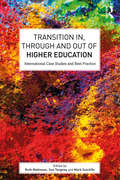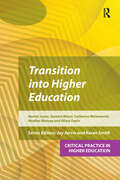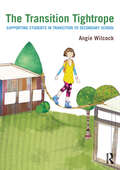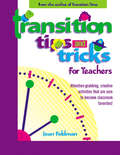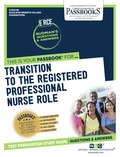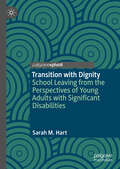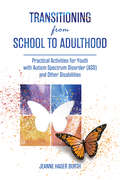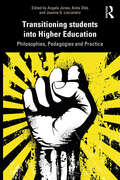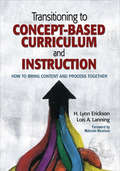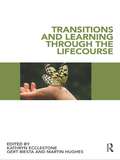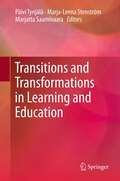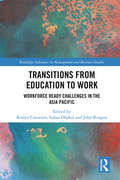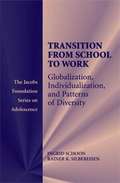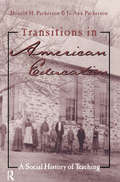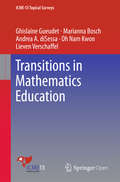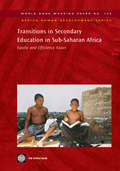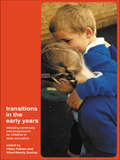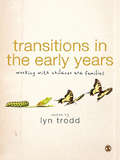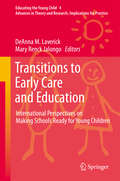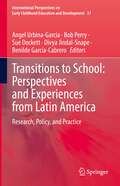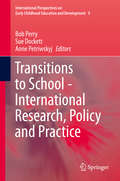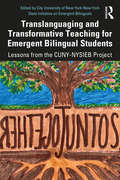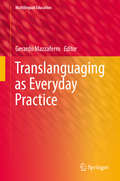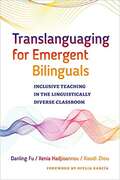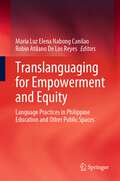- Table View
- List View
Transition In, Through and Out of Higher Education: International Case Studies and Best Practice
by Ruth Matheson Sue Tangney Mark SutcliffeTransition In, Through and Out of Higher Education: International Case Studies and Best Practice recognises that the initial steps into undergraduate education mark only the beginning of the journey for students, and that the journey involves other significant transition points that students need to negotiate. By providing theoretical knowledge alongside practical guidance and resources, this book helps those involved in university teaching guide students through their experiences and develop into autonomous, reflective learners. Putting student engagement at the centre of teaching, Transition In, Through and Out of Higher Education: International Case Studies and Best Practice includes case studies to illuminate best practice, with resources and activities that can be used and adapted to address the individual needs of students. Addressing a wide range of themes, it considers: active learning promoting engagement encouraging independence and autonomy coping with change and increasing complexity the need for belonging and identity social and academic integration developing partnership working evaluation of effectiveness of developments to teaching practice. From exploring the underlying pedagogy related to the theme to identifying the major challenges for students at key transitional points, Transition offers a comprehensive grounding to generate and inspire creative teaching that in turn enables students to better engage in the transition process. A highly practical and accessible resource, this book is suitable for all higher education staff involved in supporting students' transition in, through and out of university.
Transition into Higher Education (Critical Practice in Higher Education)
by Harriet Jones Hilary Orpin Gemma Mansi Catherine Molesworth Heather MonseyThis book will help all academic staff in higher education (HE) develop more informed teaching and better support students as they transition to university.It explores the organisations who advise students pre-university and uncovers the myths and misconceptions held by HE stakeholders. Induction and welcome activities are examined in order to identify best practice, transition problems such as study skills, employment, mental health and identity are covered, and a final chapter focuses on the effects of Covid-19 on transition issues.The Critical Practice in Higher Education series provides a scholarly and practical entry point for academics into key areas of higher education practice. Each book in the series explores an individual topic in depth, providing an overview in relation to current thinking and practice, informed by recent research. The series will be of interest to those engaged in the study of higher education, those involved in leading learning and teaching or working in academic development, and individuals seeking to explore particular topics of professional interest. Through critical engagement, this series aims to promote an expanded notion of being an academic – connecting research, teaching, scholarship, community engagement and leadership – while developing confidence and authority.
The Transition Tightrope: Supporting Students in Transition to Secondary School
by Angie WilcockThe transition phase from primary to secondary school is a time of massive personal, physical, psychological and social change. Not only is it a difficult time for the young adolescent, but it is also a challenging time for parents, teachers and anyone working with young people experiencing such substantial changes in their lives. In this highly accessible book, Angie Wilcock offers clear, practical, and realistic tips and strategies to support teachers’ and parents’ understanding of this difficult transition stage. If you are concerned that your child or pupil may have difficulty coping with the many changes and challenges associated with this phase, this book will give you insight into issues such as: understanding the developing teen and effective ways to handle them keeping up with multiple assignments creating a system of organisation and an effective work space at home maintaining a healthy balance between work, play...and sleep developing a positive attitude to school and study setting realistic goals making new friends establishing life skills which are transferable to school. Based on real-life teaching and parenting experience and full of practical, helpful case studies, this is just the resource you need to help you support and guide your developing teen.
Transition Tips and Tricks for Teachers
by Jean FeldmanThe author of the best-selling book Transition Time brings you more attention-grabbing, creative activities that provide children with an outlet for wiggles, while giving their brains a jump start with cross-lateral movement games. Grab their attention with songs, games, and fingerplays for any time of the day. These classroom-tested ideas are sure to become favorites!
Transition to the Registered Professional Nurse Role: Passbooks Study Guide (Excelsior/Regents College Examination Series)
by National Learning CorporationThe Excelsior/Regents College Examinations (E/RCE) offer you an opportunity to obtain recognition for college-level learning and consists of exams designed to demonstrate achievement and mastery of various college-level subjects, such as the Arts and Sciences, Business, Criminal Justice, Education, Health and Nursing. The E/RCE Transition to the Registered Professional Nurse Role Passbook® prepares you by sharpening knowledge of the skills and concepts necessary to succeed on the upcoming exam and the college courses that follow. It provides a series of informational texts as well as hundreds of questions and answers in the areas that will likely be covered on your upcoming exam.
Transition with Dignity: School Leaving from the Perspectives of Young Adults with Significant Disabilities
by Sarah M. HartThis book analyzes the process of leaving school, commonly referred to as 'transition' for young adults with severe, complex, and multiple disabilities. It seeks to challenge prevailing assumptions and offer practical steps towards reversing customary accepted theories, methods, practices, and outcomes. Despite extensive research, policies, and procedures of transition, the reality is that post-school outcomes are worrying for those with significant special needs. Community inclusion depends as much upon in-school procedures and support systems as it does the inclusivity of society itself. This book directly addresses these concerns by examining the experiences of young adults living through their transitions in two countries, Aotearoa New Zealand and the USA. Engaging and highly readable case narratives bring fresh insights on the diversity of disability experiences, portraying the under-explored opportunities involved in a transition with dignity. Disability is an often overlooked aspect of one’s intersectional identity. Post-school transition is therefore positioned less as a procedural function of leaving school and more so an urgent matter of social justice. Readers will benefit from the transformative framing of post-school transition based on the capability approach. Genuine opportunities within the transition of young adults with significant disabilities and those who support them may promote a thriving life for all.
Transitioning from School to Adulthood: Practical Activities for Youth with Autism Spectrum Disorder (ASD) and Other Disabilities
by Jeanne Hager BurthJust as schools educate young people to become responsible citizens who can navigate the world of post-secondary education, careers, and social life, dedicated parents also want their child to mature and be independent and happy. Youth who transition to a
Transitioning Students in Higher Education: Philosophy, Pedagogy and Practice
by Angela Jones Anita Olds Joanne G. LisciandroTransitioning Students in Higher Education focuses on the relationship between philosophy, pedagogy and practice when designing programs, units or courses for transitioning students to new educational spaces in the university environment. The term ‘transition’ is used to describe the academic as well as social movement and acculturation of students into new higher educational spaces. This book offers both theoretical perspectives and real-world practical examples that reveal the successes and challenges of implementing philosophically driven pedagogies with diverse transitioning cohorts. Drawing on examples from Australia, New Zealand, US and Canada, it writes through the relationship between philosophy, pedagogy and how it can effectively shape the practice of transition and develop the flourishing student. This book is split into three main sub-themes: Flourishing in Transition, Engaging Diverse Cohorts and Challenges for Educators, and sits at the intersections between philosophy and pedagogy in the practice of effectively engaging and transitioning different enabling groups. This book will be of great interest to postgraduate students, researchers and educators working in the areas of enabling or bridging education, higher/tertiary education, distance learning, and indigenous as well as culturally diverse cohorts.
Transitioning to Concept-Based Curriculum and Instruction: How to Bring Content and Process Together
by H. Lynn Erickson Lois A. LanningA cutting-edge model for 21st century curriculum and instruction Looking for that one transformative moment when a student’s eyes light up, signaling he or she has finally grasped that big idea behind critical academic content? Concept-based curriculum and instruction is a way to make those moments many. H. Lynn Erickson and Lois Lanning offer new insight on: How to design and implement concept-based curriculum and instruction across all subjects and grade levels Why content and process are two equally important aspects of any effective concept-based curriculum How to ensure students develop the all-important skill of synergistic thinking
Transitions and Learning through the Lifecourse
by Kathryn Ecclestone Gert Biesta Martin HughesLike many ideas that inform policy, practice and research, ‘transition’ has many meanings. Children make a transition to adulthood, pupils move from primary to secondary school, and there is then a movement from school to work, training or further education. Transitions can lead to profound and positive change and be an impetus for new learning for some individuals and be unsettling, difficult and unproductive for others. Transitions have become a key concern for policy makers and the subject of numerous policy changes over the past ten years. They are also of interest to researchers and professionals working with different groups. Transitions and Learning Through the Lifecourse examines transitions across a range of education, life and work settings. It explores the claim that successful transitions are essential for educational inclusion, social achievement, and economic prosperity and that individuals and institutions need to manage them more effectively. Aimed primarily at academic researchers and students at all levels of study across a range of disciplines, including education, careers studies, sociology, feminist and cultural studies, this book is the first systematic attempt to bring together and evaluate insights about educational, life and work transitions from a range of different fields of research. Contributions include: The transition between home and school The effects of gender, class and age Transitions to further and higher education Transitions for students with disabilities Transitions into the workplace Learning within the workplace Approaches to managing transitions
Transitions and Transformations in Learning and Education
by Päivi Tynjälä Marja-Leena Stenström Marjatta SaarnivaaraThe breakneck speed of change in today's societies creates enormous challenges for educational institutions at all levels. This volume explores ways how to manage change in educational processes and contexts, focusing, in particular, on the concepts of transition and transformation. How do we educate a skilled workforce, sensitive professionals and responsive citizens who are able not only to cope with change but also to adopt required roles as agents of change? How do we prepare students and employees to cope adequately with changes and transitions in their careers and personal lives? The first of this book's three sections deals with the conceptual and theoretical aspects of transition, transformational processes and human development. It defines these concepts and examines the ways in which educational theory and praxis understand concepts of change and development. The second section presents empirical studies that offer differing perspectives on educational transitions, covering the lifespan from early years education to lifelong learning. The third part of the volume focuses on issues of learning and pedagogy and argues that educational practices should change with the changing world. With numerous concrete examples included in the analysis, and with studies taking a range of forms from personal histories to large-scale surveys, this new book is a major addition to the literature in a field that has key implications for our future. The first of this book's three sections deals with the conceptual and theoretical aspects of transition, transformational processes and human development. It defines these concepts and examines the ways in which educational theory and praxis understand concepts of change and development. The second section presents empirical studies that offer differing perspectives on educational transitions, covering the lifespan from early years education to lifelong learning. The third part of the volume focuses on issues of learning and pedagogy and argues that educational practices should change with the changing world. With numerous concrete examples included in the analysis, and with studies taking a range of forms from personal histories to large-scale surveys, this new book is a major addition to the literature in a field that has key implications for our future.
Transitions from Education to Work: Workforce Ready Challenges in the Asia Pacific (Routledge Advances in Management and Business Studies)
by Roslyn Cameron Subas Dhakal John BurgessLabour markets are becoming more dynamic in response to pressures from globalisation, new technologies and trade agreements, as well as cross-border migration, inter-generation differences, changing education imperatives and employer expectations. By focusing on several Asia Pacific countries, this book explores the differences in their workforces: ageing, or abundant in labour but lacking in skilled employees. One similarity these countries share is the difficulty in attracting and retaining employees with the required skillset and capabilities, and these constraints can stymie national economic growth and long term development. This book brings together national and international perspectives on employability challenges faced by selected countries in the Asia Pacific region. While the region is forecast to enjoy high growth in the coming decade, a recurring challenge is addressing skill shortages and ensuring effective transition from training colleges and universities into employment. Consequently, the book focuses on the roles of multiple stakeholders, primarily: governments, education providers and employers – in more effectively addressing these key socio-economic challenges.
Transitions From School To Work: Globalization, Individualization, and Patterns of Diversity
by Ingrid Schoon Rainer K. SilbereisenThis volume makes an important contribution to the growing literature on the transition from school to work. It provides a unique perspective on the global changes that have transformed school-to-work transitions since the 1970s; offers an integrative conceptual framework for analysis; and promotes a comparative, cross-national understanding of school-to-work transitions in a changing social context. The articles assembled in this volume compare and assess variations in school-to-work transitions across Europe and North America, providing empirical evidence on how young people negotiate the different options and opportunities available and assessing the costs and returns associated with different transition strategies. Unlike many other volumes on this subject - which are pitched at either the macro or micro level - this volume attempts to integrate both perspectives, capturing the complexity of this critical life course transition. Furthermore, the authors address policies aimed at improving the capacity of individuals to make effective transitions and at enabling societies to better coordinate educational and occupational institutions.
Transitions in American Education: A Social History of Teaching (Studies in the History of Education)
by Donald Parkerson Jo Ann PakersonThis book is a concise social history of teaching from the colonial period to the present. By revealing the words of teachers themselves, it brings their stories to life. Synthesizing decades of research on teaching, it places important topics such as discipline in the classroom, technology, and cultural diversity within historical perspective.
Transitions in Mathematics Education
by Ghislaine Gueudet Marianna Bosch Andrea A. A. Disessa Oh Nam Nam Kwon Lieven VerschaffelThis book examines the kinds of transitions that have been studied in mathematics education research. It defines transition as a process of change, and describes learning in an educational context as a transition process. The book focuses on research in the area of mathematics education, and starts out with a literature review, describing the epistemological, cognitive, institutional and sociocultural perspectives on transition. It then looks at the research questions posed in the studies and their link with transition, and examines the theoretical approaches and methods used. It explores whether the research conducted has led to the identification of continuous processes, successive steps, or discontinuities. It answers the question of whether there are difficulties attached to the discontinuities identified, and if so, whether the research proposes means to reduce the gap to create a transition. The book concludes with directions for future research on transitions in mathematics education. "
Transitions in Secondary Education in Sub-Saharan Africa
by World BankThis World Bank Working Paper discusses equity and efficiency issues in secondary education transitions in Sub-Saharan Africa. Its main purpose is to identify and analyze national, regional, and local measures that may lead to the development of more efficient and seamless transitions between post-primary education pathways. In most African countries student transition from primary to junior secondary is still accompanied by significant repetition and dropout. Transitions within the secondary cycle also cause significant losses and should use more effective assessment and selection methodologies. According to global trends, Africa needs to revisit its post-primary structures to provide more diversified (academic and non-academic) pathways of learning which respond better to the continent's present economic and social realities. In the end, the main goal should be to produce young people who can become productive citizens and lead healthy lives, as demonstrated by middle and higher-income economies.
Transitions in the Early Years: Debating Continuity and Progression for Children in Early Education
by Hilary Fabian Aline-Wendy DunlopBy the time young children enter statutory education, they may have already attended a number of different educational settings, from entry to group settings outside home, to joining playgroup or nursery school. Each of these experiences is likely to affect children's capacity to adjust and to learn.This book focuses on children's experiences of personal and curricular transitions in early childhood. The authors are all academics with international reputations in the field of early childhood education. They draw on their research in Europe, Australasia and the USA to consider issues such as:*the optimum environment and appropriate pedagogy for young children's learning*how children, parents and educators cope with the transition from home to the first educational settings*the ways in which professionals can better support and empower children in transitionThe perspectives of children, parents and early years educators are all considered and case study examples are used throughout.This book will be essential reading for anyone involved in working with young children and their families, including students on early years courses, early years practitioners and early years policy makers.
Transitions in the Early Years: Working with Children and Families
by Lyn TroddDesigned to facilitate professional development and critical reflection in the leadership of services for children and families, this book will enhance the understanding of readers from a range of disciplines and at varying levels of study. Packed with case studies depicting the experiences of children and their families in transition and exploring a wide range of scenarios, the chapters: - explore transitions from a range of perspectives - discuss the value of developing collaborative practice in deepening awareness of children's views and experiences - look at examples of contemporary practice - consider the ethics, policies and law relating to current issues - enrich the reader's understanding of professional responsibility Each chapter contains a chapter overview, a case study and suggestions for further reading. This book is relevant to all practitioners working with young children and their families and to all those studying early childhood. Lyn Trodd is the Head of Multi-Professional Education at the University of Hertfordshire
Transitions to Early Care and Education
by Mary Renck Jalongo Deanna M. LaverickTransitions to new educational experiences are a universal rite of passage encountered by children worldwide. This volume in the Educating the Young Child: Advances in Theory and Research, Implications for Practice series provides early childhood educators with a resource that focuses on the transitions that young children make to early care and education settings, along with the issues that surround this important time in their lives. New experiences, such as the start of formal schooling, mark important and exciting events that also evoke different reactions from children and their families. The diverse experiences, traits, and needs exhibited by young children provide early childhood educators with what may be a potentially challenging role. With an international focus, the purpose of Transitions to Early Care and Education: International Perspectives on Making Schools Ready for Young Children is to communicate an enlarged view of the transition process in order to appreciate and honor the promise and potential of all children worldwide. Contributing to this volume are a group of distinguished researchers, practitioners, and educators in the field of early childhood education. Their collective expertise is shared with those who are committed to educating and caring for young children and the families they serve.
Transitions to School: Research, Policy, and Practice (International Perspectives on Early Childhood Education and Development #37)
by Angel Urbina-García Bob Perry Sue Dockett Divya Jindal-Snape Benilde García-CabreroThis book showcases the quality work that Latin American researchers have done on transition to school in Latin American countries by offering the English-speaking world, first-hand access to some Latin American transitions research, practices, and policies. This book shows the work carried out in countries such as Brazil, Chile, Cuba, and Mexico with regards to the way in which the transition to primary school is experienced from different stakeholders' perspectives, and how Latin American educational policies and cultural practices shape such an important process for stakeholders. This book was importantly framed by the COVID-19 pandemic which placed the world in a global health emergency, and it is our hope that this book will trigger future international collaborations between researchers, policy makers, and practitioners interested in transitions which could help produce a wealth of empirical evidence to inform educational policies and transitions practices across the world. Building networks where diverse experiences are valued and respected, as well as analysed, can help provide a platform that supports educators and researchers as they continue their work and branch out in new and challenging directions.
Transitions to School - International Research, Policy and Practice
by Bob Perry Sue Dockett Anne PetriwskyjThis book provides an important compilation and synthesis of current work in transition to school research. The book focuses strongly on the theoretical underpinnings of research in transition to school. It outlines key theoretical positions and connects those to the implications for policy and practice, thereby challenging readers to re-conceptualize their understandings, expectations and perceptions of transition to school. The exploration of this range of theoretical perspectives and the application of these to a wide range of research and research contexts makes this book an important and innovative contribution to the scholarship of transition to school research. A substantial part of the book is devoted to detailed examples of transition to school practice. These chapters provide innovative examples of evidence-based practice and contribute in turn, to practice-based evidence. The book is also devoted to considering policy issues and implications related to the transition to school. It records a genuine, collaborative effort to bring together a range of perspectives into a Transition to School Position Statement that will inform ongoing research, practice and policy. The collaborative, research, policy and practice based development of this position statement represents a world-first.
Translanguaging and Transformative Teaching for Emergent Bilingual Students: Lessons from the CUNY-NYSIEB Project
by Ofelia GarcíaA critical and accessible text, this book provides a foundation for translanguaging theory and practice with educating emergent bilingual students. The product of the internationally renowned and trailblazing City University of New York-New York State Initiative on Emergent Bilinguals (CUNY-NYSIEB), this book draws on a common vision of translanguaging to present different perspectives of its practice and outcomes in real schools. It tells the story of the collaborative project’s positive impact on instruction and assessment in different contexts, and explores the potential for transformation in teacher education. Acknowledging oppressive traditions and obstacles facing language minoritized students, this book provides a pathway for combatting racism, monolingualism, classism and colonialism in the classroom and offers narratives, strategies and pedagogical practices to liberate and engage emergent bilingual students. This book is an essential text for all teacher educators, researchers, scholars, and students in TESOL and bilingual education, as well as educators working with language minoritized students.
Translanguaging as Everyday Practice (Multilingual Education #28)
by Gerardo MazzaferroThis volume offers empirically grounded perspectives on translanguaging as a locally situated, interactional accomplishment of practical action, and its significance within different domains of social life-school, education, diasporic families and communities, workplaces, urban linguistic landscapes, advertising practices and mental health centres – focusing on case studies from different countries and continents. The 14 chapters contribute to the understanding of translanguaging as a communicative and discursive practice, which is relationally constructed and strategically deployed by individuals during everyday encounters with language and cultural diversity. The contributions testify to translanguaging as an interdisciplinary and critical research paradigm by assembling scholars working on translanguaging from different perspectives, and a wide range of social, cultural, and geographical contexts. This volume contributes to the further development of new theoretical and analytical tools for the investigation of translanguaging as everyday practice, and how and why language practices are constructed, negotiated, opposed or subverted by social actors.
Translanguaging for Emergent Bilinguals: Inclusive Teaching in the Linguistically Diverse Classroom
by Danling Fu Xenia Hadjioannou Xiaodi Zhou Ofelia García Celia Genishi Donna E. AlvermannTranslanguaging for Emergent Bilinguals is a thorough examination of the development, evolution, and current realities of educating emergent bilinguals in U.S. classrooms. <p><p> Through engaging vignettes, readers follow the experiences of emergent bilinguals in a variety of monolingual settings, tracing the challenges encountered by both the students and the schools that serve them. The authors argue that the future of emergent bilingual education lies in an inclusive translanguaging pedagogy. By embracing home languages and cultures, this approach nurtures the development of multiple literacies, enabling individuals to thrive academically, socially, linguistically, and intellectually. <p><p> The text begins by showing how the authors evolved from monolingual language educators to translanguaging educators and ends with concrete takeaways for successfully using this approach in different education settings.
Translanguaging for Empowerment and Equity: Language Practices in Philippine Education and Other Public Spaces
by Maria Luz Elena Nabong Canilao Robin Atilano De Los ReyesThis book investigates how translanguaging is employed for pedagogical purposes and describes how speakers use translanguaging in specific multilingual contexts. It examines the beliefs and perceptions that shape translanguaging in different public spaces and interrogates the notion of translanguaging through the lens of various Philippine public spaces. This book also focuses on the breakthroughs that may be achieved through translanguaging in the academic field and other domains. It presents studies conducted in the Philippines, a multilingual and post-colonial setting where many multilingual speakers engage in translanguaging practices while recognizing the significance of each language in their communication repertoire in expressing their ideas and identities. It provides insights and knowledge on the current language practices in basic and tertiary education and offers more information about the crucial role of translanguaging in the government, media, and church domains in the Philippines. While this book mainly covers the use of translanguaging in various domains in the Philippines, it remains relevant to other multilingual societies around the world. Being a highly multilingual society, the Philippines serves as a global case study for understanding multilingualism. This book demonstrates how blocks to translanguaging may be overcome and explores possibilities that may be considered in introducing it as an effective pedagogical and communication tool. It emphasizes the importance of recognizing the translingual paradigm as a strong force that has been adopted by multilingual language users to promote empowerment and equity.
